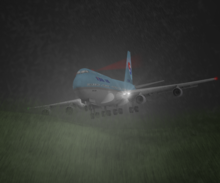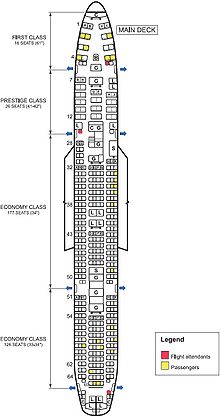| Revision as of 16:47, 21 December 2007 editWhisperToMe (talk | contribs)Autopatrolled, Extended confirmed users663,056 editsmNo edit summary← Previous edit | Revision as of 01:55, 28 December 2007 edit undoO (talk | contribs)Autopatrolled, Extended confirmed users, Pending changes reviewers, Rollbackers11,413 edits →External link: + catNext edit → | ||
| Line 72: | Line 72: | ||
| ] | ] | ||
| ] | ] | ||
| ] | |||
| ] | ] | ||
Revision as of 01:55, 28 December 2007
 CG render of 747-3B5 HL7468 CG render of 747-3B5 HL7468Korean Air Flight 801 | |
| Occurrence | |
|---|---|
| Date | 6 August 1997 |
| Summary | Controlled flight into terrain |
| Site | Nimitz Hill, Guam |
| Aircraft type | Boeing 747-3B5 |
| Operator | Korean Air |
| Registration | HL7468 |
| Flight origin | Gimpo International Airport |
| Destination | Antonio B. Won Pat International Airport |
| Passengers | 237 |
| Crew | 17 |
| Fatalities | 228 |
| Survivors | 26 |

Korean Air Flight 801 (KE801, KAL801) crashed on August 6, 1997 on approach to Antonio B. Won Pat International Airport, Guam.
The flight normally used the Airbus A300 as its equipment. Since the airline had the August 6 flight scheduled to transport athletes to American Samoa, the Boeing 747-3B5, designated HL7468, became the equipment of the flight.
The disaster
The Korean Air Boeing 747-3B5 jetliner flew on a route from Seoul, South Korea to Guam. It departed from Seoul-Kimpo International Airport (now Gimpo International Airport) at 8:53 p.m. (9:53 p.m. Guam time) on August 5. It carried 2 pilots, 1 flight engineer, 14 flight attendants, and 237 passengers (Pg. 11, 23 of 226), resulting total of 254 people. Of the passengers, 3 were children between the ages of 2 and 12 and 3 were 24 months old or younger (Pg. 45, 57 of 226).
The flight was uneventful until shortly after 1:00 a.m. on August 6, as the jet was preparing to land. There was heavy rain at Guam so visibility was significantly reduced and the crew was attempting an instrument landing. However, air traffic control in Guam advised the crew that the glideslope Instrument Landing System (ILS) in runway 6L was out of service. Nevertheless, air traffic control cleared Flight 801 to land in runway 6L at around 1:40a.m. The crew noticed that the plane was descending very steeply, and noted several times that the airport "is not in sight". (Investigative sources later noted that neither the copilot nor the flight engineer spoke out boldly, as trained, to alert the captain or even to urge breaking off the landing.) At 1:42, the aircraft crashed into Nimitz Hill, about 3 miles (5 km) short of the runway, at an altitude of 660 feet (201 m).
Of the people on board, 223 people, including 209 passengers and 14 crew members (3 flight crew and 11 cabin crew) (Pg. 45, 57 of 226), were killed at the crash site. Of the 31 occupants found alive by rescue crews, 2 passengers died en-route to the hospital and 3 other passengers died within 30 days. One of the two passengers that died en-route to the hospital, a female, sustained multiple internal injuries and had no burns and no soot in her airway, leading autopsy to classify her death as not of any one cause. Upon discovery she was alive and treated by rescuers (Pg. 45, 57 of 226). 23 passengers and 3 flight attendants survived the crash with serious injuries (Pg. 11, 23 of 226). Of the survivors, 7 passengers and 1 flight attendant were in first class, 1 flight attendant was in the prestige class section, 7 passengers were in the forward economy class section, and 9 passengers and 1 flight attendant were in the aft economy section. 13 of the surviving passengers and 2 of the surviving flight attendants were seated in the right side of the airplane, and 6 of the 13 passengers were seated over the right wing (Pg. 45, 57 of 226).
The rescue effort was hampered by the weather, terrain, and other problems. Emergency vehicles could not approach due to a fuel pipeline destroyed by the crash and blocking the narrow road. There was confusion over the administration of the effort; the crash occurred on land owned by the United States Navy but civil authorities initially claimed authority. The hull had disintegrated, and jet fuel in the wing tanks had sparked a fire which was still burning eight hours after impact.
The U.S. National Transportation Safety Board investigation report stated that the Minimum Safe Altitude Warning (MSAW) system had been deliberately modified and would not detect the plane that close to the runway. The captain failed to brief his non-precision approach and prematurely descended to decision height. Contributing to the accident were the captain's fatigue, Korean Air's lack of flight crew training, as well as the intentional inhibition of the Guam ILS. The crew had been using an outdated flight map, which stated that the Minimum Safe Altitude for a landing plane was 1770 feet (540 m) as opposed to 2150 feet (656 m). Flight 801 had been maintaining 1870 feet (570 m) when it was waiting to land.
Rika Matsuda
Governor Carl T.C. Gutierrez found Rika Matsuda, a South Korean citizen from Japan who boarded the flight with her mother, Cho Sung Yeo (also known as Shigeko ). Cho could not free herself from the aircraft and told Rika to run away. Cho died in the fire as a surviving flight attendant, Lee Yong Ho, found Rika and traveled with her until the two encountered Gutierrez. Jesus C. Taitingfong, a Guamanian firefighter, stated that he believes that Gutierrez exaggerated his contribution to the rescue operation and used the news story as a political advantage.
After the crash
On August 6, 2000, the third anniversary of the crash, a black marble obelisk was unveiled on the crash site as a memorial to the victims.
After the accident, the flight number for the route was changed to Flight 805. The aircraft is now designated as Boeing 777-200/200ER.
This incident was documented on Mayday (Air Emergency or Air Crash Investigation), episode Blind Landing. In 2000, a lawsuit was settled in the amount of $70,000,000 on behalf of 54 families.
References
- "Official Guam Crash Site Center - Korean Air Flt 801," Government of Guam
- "Honeymoon flight that ended in horror," The Independent
- "Jet hell Rika's scars will last forever.," Daily Record)
- "Korean Air Survivor - Rika's Miracle," Government of Guam
- "Guam's governor seizes main chance," The Independent, August 11, 1997
- NTSB: Korean Air Flight 801 Final Report, including animations and hearing transcripts
- AirDisaster.com hosted NTSB report: http://www.airdisaster.com/reports/ntsb/AAR00-01.pdf
- Government of Guam: Guam Crash Site Center - Korean Air Flight 801, photographs, passenger manifest, scanned news articles, and related links
- PBS Newshour with Jim Lehrer: "Tragedy on Guam," August 6, 1997
- "List of passengers aboard Korean Air Flight 801" (also lists crew members) CNN
- Airline's List Of Survivors," The New York Times
- Focus shifts to cause of Korean Air crash CNN
- "Guam's governor seizes main chance," The Independent, August 11, 1997
- "Pilot Error Is Suspected in Crash on Guam," The New York Times
- Guam rescuers: 27 survivors, no more expected, CNN
- Pilot error focus in Guam crash, CNN
- Photos used to identify Guam crash victims, CNN
- 29 Survive the Guam Crash, but Hope for Others Ends, The New York Times
- Rescuers search smoldering jet debris in Guam, CNN
- Tragedy on Guam, PBS
13°27.35′N 144°43.92′E / 13.45583°N 144.73200°E / 13.45583; 144.73200